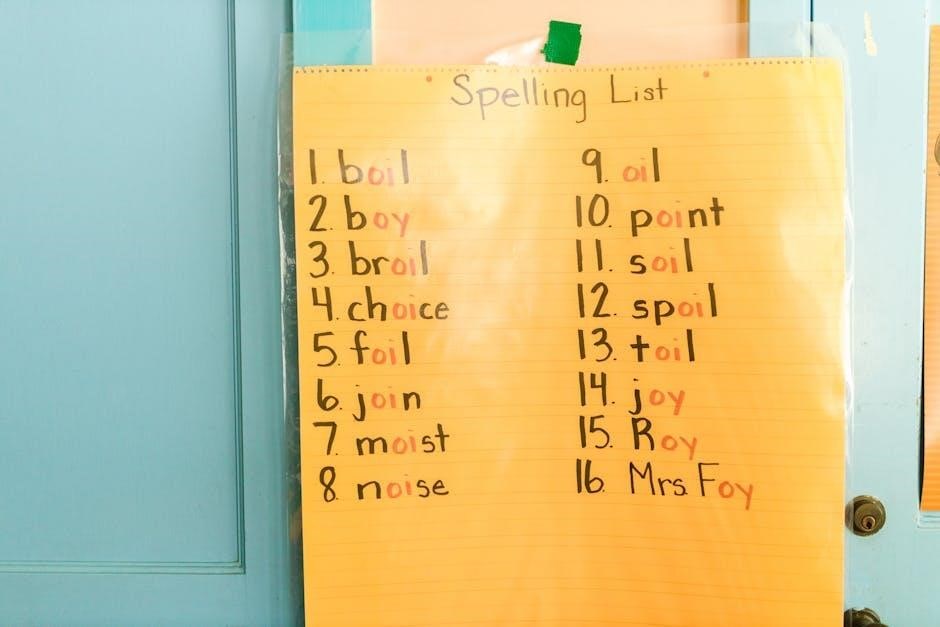Mastering math vocabulary is essential for understanding fundamental concepts and problem-solving. Key terms like “equation,” “exponent,” and “absolute value” build a strong foundation. Learning these terms enhances mathematical communication and confidence.
Overview of Math Vocabulary
Math vocabulary encompasses a comprehensive set of terms essential for understanding mathematical concepts. It includes basic operations like “equation” and “exponent,” as well as geometry terms such as “volume” and “properties.” These words are organized by grade levels and math strands, ensuring clarity and progression. Resources like math vocabulary word lists and glossaries provide definitions and examples, aiding students and educators. Vocabulary lists often highlight key terms, such as “absolute value” and “equivalent,” and are tailored to specific curricula. This structured approach helps learners build a strong foundation, enabling effective communication and problem-solving in mathematics.
Key Concepts in Math Terminology
Math terminology includes essential concepts like “equation,” “exponent,” and “absolute value,” which are fundamental across various math levels. Terms such as “volume” and “properties” are crucial in geometry, while “combine” and “predict” aid in problem-solving strategies. These concepts are often introduced in grade-specific math vocabulary word lists, ensuring a progressive learning curve. For instance, “equivalent” and “less” are basic terms taught early, while “exponent” and “expressions” are introduced in higher grades. Understanding these terms is vital for effective mathematical communication and for tackling complex problems with confidence.

Importance of Math Vocabulary in Education
Math vocabulary builds foundational knowledge, enhances communication, and improves problem-solving skills. Understanding key terms enables students to grasp concepts, express ideas clearly, and approach challenges confidently in math.
Foundational Knowledge for Problem Solving
Math vocabulary forms the backbone of problem-solving by providing clear definitions and concepts. Understanding terms like equation, exponent, and absolute value equips students to decode problems and apply strategies effectively. These words act as building blocks, enabling learners to break down complex tasks into manageable steps. For instance, grasping volume and difference aids in visualizing and calculating spatial measurements and numerical relationships. Teachers often use vocabulary lists to reinforce these concepts, ensuring students can articulate their thought processes clearly. This foundational knowledge not only enhances accuracy but also fosters confidence in tackling diverse mathematical challenges, preparing students for advanced problem-solving in higher grades.
Enhancing Communication in Math
Math vocabulary plays a crucial role in enhancing communication among students, teachers, and peers. Clear understanding of terms like equation, exponent, and volume ensures precise articulation of ideas. When students grasp these words, they can describe mathematical concepts confidently, fostering effective discussions. For instance, using terms like difference or absolute value clarifies problem explanations. Shared vocabulary also bridges gaps in understanding, allowing for seamless collaboration in group work. Educators often emphasize these terms to create a common language, making lessons more engaging and accessible. By mastering math vocabulary, learners develop the ability to express their reasoning clearly, fostering a deeper understanding of mathematical principles and improving overall communication skills.
Improving Problem-Solving Skills
Mastering math vocabulary significantly enhances problem-solving abilities by providing a clear understanding of key terms and concepts. Knowing words like equation, exponent, and volume helps students identify operations and relationships in problems. For example, understanding difference and absolute value aids in calculating distances and comparisons. Familiarity with these terms allows learners to break down problems into manageable parts, apply appropriate strategies, and arrive at accurate solutions. Strong vocabulary also promotes critical thinking and logical reasoning, essential for tackling complex math challenges. By grasping these terms, students develop a systematic approach to problem-solving, leading to improved accuracy and confidence in their mathematical abilities.

Sources for Math Vocabulary PDFs
Reputable educational publishers, online platforms, and school-specific lists provide essential math vocabulary PDFs. Resources like Pearson’s Power Maths and Year 5/7 lists are widely recommended for comprehensive learning.
Common Educational Publishers
Prominent educational publishers like Pearson and Oxford University Press offer comprehensive math vocabulary PDFs. Pearson’s Power Maths series includes detailed key vocabulary lists for various grades, ensuring clarity and accessibility. These resources are structured to align with curriculum requirements, providing definitions and examples that cater to different learning levels. Publishers often organize terms alphabetically, making it easier for students and teachers to reference them. Additionally, many publishers incorporate visual aids and practical exercises to enhance understanding. Their materials are widely trusted and used in classrooms globally, making them a reliable source for mastering mathematical terminology effectively.
Online Platforms and Resources

Several online platforms provide accessible math vocabulary PDFs for students and educators. Websites like Pearson and QCA offer downloadable resources, including glossaries and term lists. Educational databases and teaching resource platforms also feature comprehensive math vocabulary PDFs tailored to specific grades and curricula. These resources often include definitions, examples, and interactive exercises to enhance learning. Additionally, platforms like Teachers Pay Teachers and Math Open Reference offer customizable worksheets and guides. These online tools are invaluable for reinforcing mathematical terminology and ensuring students grasp key concepts effectively. They cater to diverse learning styles, making them a popular choice for both classrooms and self-study.
School and Curriculum-Specific Lists
Schools often provide tailored math vocabulary PDFs aligned with their curriculum. These lists highlight key terms for specific grades, such as Year 5 or Year 7, ensuring relevance to classroom learning. Many educational institutions use resources from publishers like Pearson or refer to curriculum guides like those from QCA. These lists are designed to match teaching programmes, with terms like “equation” or “exponent” emphasized. They also include definitions and examples, making them valuable for both teachers and students. Schools may update these lists annually to reflect evolving curriculum requirements, ensuring students build a strong foundation in mathematical terminology. These resources are often shared digitally, making them easily accessible for learning and review.

Understanding Key Math Terms
Understanding key math terms like absolute value, equation, and exponent is crucial. These terms define mathematical concepts, aiding in problem-solving and clear communication. Mastering them enhances learning and application.
Basic Operations and Symbols
Basic operations and symbols are the building blocks of mathematics. Addition (+), subtraction (-), multiplication (×), and division (÷) are fundamental operations. Symbols like equal (=), greater than (>), and less than (<) simplify expressions. Terms such as equation, exponent, and absolute value are essential for understanding mathematical relationships. These symbols and operations form the foundation of problem-solving and communication in math. Learning these basics ensures clarity and accuracy in calculations. They are widely used in math vocabulary PDFs to introduce core concepts. Mastering these symbols and operations is crucial for progressing in mathematics. Avoiding mistakes relies on understanding their meanings and applications. Start with these basics to build a strong mathematical foundation.
Geometry and Measurement Terms
Geometry and measurement terms form a crucial part of math vocabulary. Key terms include perimeter, area, volume, and units of measurement like meters, liters, and grams. Understanding shapes such as triangles, squares, and circles is fundamental. Terms like dimension, angle, and degree are essential for spatial reasoning. Measurement terms like capacity and weight help quantify physical properties. These terms are vital for solving real-world problems, from calculating room dimensions to measuring ingredients. Math vocabulary PDFs often include these terms to aid learning. Grasping geometry and measurement terms enhances problem-solving skills and practical applications, making math more accessible and relatable. They are foundational for higher-level math concepts and everyday calculations.
Algebra and Advanced Concepts
Algebra and advanced math concepts rely heavily on specific vocabulary. Terms like variable, coefficient, and polynomial are foundational. Understanding equations, expressions, and functions is critical for solving algebraic problems. Advanced concepts include logarithms, matrices, and quadratic equations. These terms are often included in math vocabulary PDFs to help students grasp complex ideas. Mastering algebraic vocabulary enhances analytical skills and prepares students for higher-level math. These terms are essential for problem-solving in science, engineering, and real-world applications. Math vocabulary resources emphasize these concepts to ensure a solid understanding of algebra and its practical uses. Learning these terms builds a strong foundation for advanced mathematical studies and critical thinking.

Strategies for Learning Math Vocabulary
Engage with flashcards, group activities, and interactive games to build familiarity with math terms. Incorporate visual aids and real-life examples to deepen understanding and retention of key concepts.
Interactive and Engaging Methods
Engaging students with interactive methods enhances math vocabulary learning. Tools like flashcards, matching games, and crossword puzzles make learning fun and effective. Group activities, such as role-playing or competitive quizzes, encourage teamwork and active participation. Incorporating technology, like educational apps or online games, caters to digital learners. Hands-on exercises, such as creating vocabulary walls or sorting games, reinforce retention. Real-life applications, such as problem-solving scenarios, help students connect terms to practical contexts. Interactive whiteboards and collaborative projects further enrich the learning experience, ensuring students remain motivated and involved in mastering math vocabulary.
Practical Applications and Examples
Applying math vocabulary in real-world contexts deepens understanding and retention. For instance, using terms like “equivalent” or “volume” in everyday scenarios, such as cooking or construction, demonstrates their relevance. Teachers can provide word problems that mirror real-life situations, making learning relatable. Examples include calculating the distance for a road trip using “absolute value” or measuring room dimensions for “area.” Such practical applications help students visualize how vocabulary is used outside the classroom. Incorporating examples from various fields, like engineering or finance, further illustrates the versatility of math terms. This approach not only builds fluency but also prepares students for future academic and professional challenges.

Assessment and Reinforcement
Quizzes and worksheets are effective tools for assessing math vocabulary knowledge; Regular practice and real-world applications reinforce learning, ensuring students retain and confidently use mathematical terms.
Quizzes and Worksheets
Quizzes and worksheets are essential tools for assessing and reinforcing math vocabulary. They provide structured opportunities for students to practice and apply their knowledge of key terms. Regular quizzes help identify gaps in understanding, allowing for targeted review. Worksheets offer hands-on exercises, such as matching games or fill-in-the-blank activities, to engage students. These resources often include terms like “equation,” “exponent,” and “absolute value,” ensuring familiarity with critical concepts. By using these materials, students build confidence and fluency in mathematical communication, making them better prepared for problem-solving and real-world applications. Consistent practice through quizzes and worksheets solidifies retention and enhances overall mathematical proficiency.
Real-World Applications
Understanding math vocabulary is crucial for real-world applications, such as engineering, finance, and science. Terms like “equation” and “exponent” are used to calculate distances in engineering or model population growth in biology. In finance, concepts like “absolute value” help assess risks and manage budgets. Math vocabulary enables individuals to interpret data, make informed decisions, and solve practical problems. For example, understanding “equivalent ratios” aids in scaling recipes or construction plans. These skills are invaluable in everyday tasks, from measuring ingredients to calculating expenses. Mastery of math terms bridges the gap between theoretical learning and practical implementation, enhancing problem-solving abilities in diverse scenarios.
